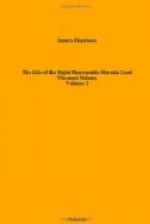in these respects, constantly so peculiarly unfortunate.
After the Earl of St. Vincent left the Mediterranean
command, Lord Nelson was soon superceded by the arrival
of Lord Keith; and, when Sir Hyde Parker returned
home, after the battle of Copenhagen, his lordship
almost immediately followed. On neither of these
occasions, nor in the subsequent affair of Boulogne,
so soon succeeded by peace, could he derive much advantage
as a commander in chief: and, though he had now
held the Mediterranean command more than two years,
the terror of his name, by confining the enemy to their
ports, prevented it’s being very profitable;
while the peculiar nature of his situation, with regard
to the difficulties of obtaining intelligence, as
well as requisite supplies and refreshments, occasioned
private expences which considerably abridged his emoluments.
It is true that, as far as related to himself, he
might have contrived to live in retirement on his
pension and half-pay; but he could by no means make
any suitable provision for those whom he conceived
to have claims on his protection. This expedition,
he trusted, would enable him, at length, to accomplish
the wish of his heart, by placing all who were most
dear to him in situations of easy independence.
If he should survive, the brilliance of the glorious
victory which he anticipated, might probably qualify
himself sufficiently to exalt them; if he should fall,
he would not permit himself to doubt, that the generous
nation which he loved, and in whose just cause his
last blood would be so freely shed, could ever hesitate
a moment amply to provide for every beloved object
of his anxious regard, with this confident hope bequeathed
to the benign protection of his king and country.
On Friday, the 13th of September, the Victory having
been compleatly prepared, dropped down to St. Helen’s,
ready for the hero’s reception. To his
lordship and friends, this was a terrible day.
Some of his relatives had previously left Merton,
that they might escape the dreaded agonies of so painful
a separation. Mr. and Mrs. Matcham continued to
the last; and sustained, with their best fortitude,
the severe shock of such a parting. His lordship,
kindly affectionate to all, had repeatedly declared
that, from the first prize-money which he should be
fortunate enough to obtain, amounting to thirty thousand
pounds, he would make a present of five thousand to
his brother, and the same sum to each of his two sisters:
and, on Mr. Matcham’s expressing a wish that
his lordship might retain Mrs. Matcham’s share,
he replied—“No; she has an equal
claim with her other sister and my brother.”
So equally did they all participate in his fraternal
regards.




